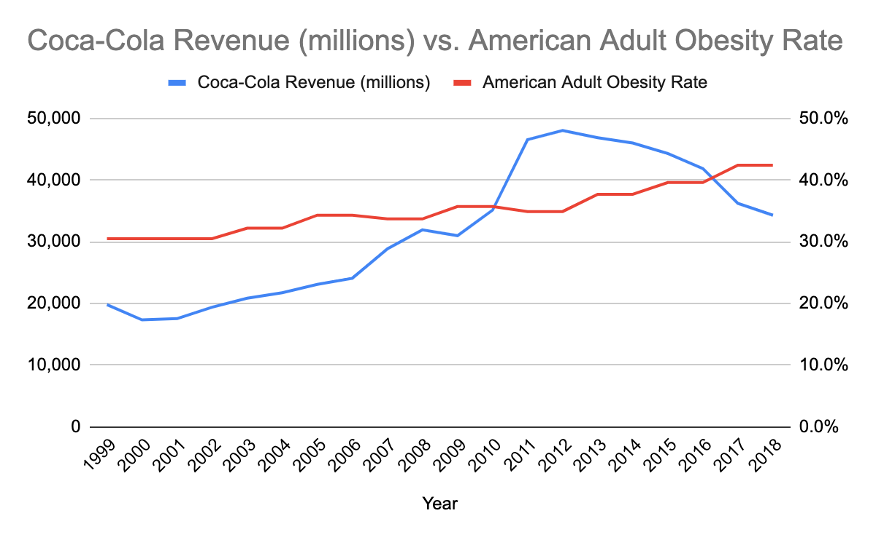
David Tonelson / Shutterstock
While Coca-Cola has offered delicious drinks for more than a century, the health effects of soft drinks must be analyzed. Read on to learn Coca-Cola’s impact on public health, obesity, and our economy.

David Tonelson / Shutterstock
Coca-Cola is one of the most recognizable brands on our planet today. For instance, one study by CoreBrand found that Coke is the U.S. corporate asset with the most “brand power.”
Behind that consummate brand is a classic, yet mysterious concoction of water, sugar, caffeine, and a whole host of other ingredients. More than 125 years since the company’s founding, adults and children around the world have continued to love the taste of an ice-cold Coke. Recent estimates show that the company sells 1.8 billion bottles every day.
Yet while a vast number of people around the world continue to consume Coke, the company has faced much greater scrutiny related to health. Specifically, some health experts claim that Coca-Cola contributes to obesity. In this article, we want to explore that claim further. By doing so, we can better understand the Coca-Cola company itself and its relationship to public health.
The Coca-Cola Company and its drinks do provide value to the world. Original Coke, along with the many other drinks that it sells, quenches drinkers’ thirst. Luminaries like Warren Buffett have long espoused Coke’s taste and the company’s financial prowess. And while Coca-Cola claims that it does not market directly to children, children also tend to enjoy the taste.
While the taste keeps adults and children coming back for more, the health effects of Coca-Cola have given drinkers pause. Many of these concerns are related to sugar. If you look across the world, total sugar production has risen to approximately 188 million tons. Worldwide sugar consumption is about 178 million tons, which is about 95% of total sugar production. Looking at the United States, production is a little over eight million tons per year and consumption is around 11 million tons per year.
Simply put, humans love sugar. That being said, there are extensive medical studies and literature that show a direct correlation between the consumption of sugar-sweetened beverages and obesity in both children and adults. The average 12-ounce can of Coca-Cola has around 39 grams of sugar (equivalent to 9 ⅓ teaspoons of sugar). While the number is somewhat dated, Coca-Cola’s estimated total cane sugar consumption was five million tons in 2017. Therefore, we can assume that non-Coca-Cola sugar production is somewhere around 183 million tons. Thinking of it another way, Coca-Cola represents at least 2.5% of total sugar production.
As you can see, there are plenty of other foods and beverages that fulfill humans’ desire for sugar. That being said, Coca-Cola is a market leader and the world’s largest beverage company. A paper in the International Journal of Environmental Research and Public Health said that several years ago, Coca-Cola’s tried to sell Coke to teens in the middle of an obesity crisis. One expert even argued that the company’s tactics rivaled tactics that were used in the tobacco industry.
Looking at Coca-Cola’s sales growth and obesity growth among American adults, you can see that the data is mixed.

While Coca-Cola’s revenues have declined in recent years, we continue to see the obesity rate continue to climb. One theory is that recent customers are more aware of how sugary drinks lead to obesity, causing Coke sales to fall. Coca-Cola isn’t the only factor contributing to American obesity, yet its sugary drinks continue to lead to poor health outcomes for its customers.
The direct effect on deaths is also difficult to see. A 2015 study (which you can find here) noted that there were 184,000 global deaths in 2010 from the consumption of sugary drinks. A rough estimate shows that Coca-Cola had around 51% of the global soft drink market around that time. This would net out to around little over 90,000 global deaths due to Coca-Cola. The Coca-Cola company itself, along with its bottling partners, has around 700,000 employees. If you count index funds and mutual funds, there are millions of Coca-Cola shareholders. Millions of consumers drink Coca-Cola every year, yet do not develop immediate health issues.
Ultimately, the health effects of obesity are costly. One study showed that the UK’s National Health Service spent around £5.1 billion in 2014/2015 on the treatment of obesity and ill-related health. In the United States alone, that figure was $150 billion to $190 billion. These are real costs that must be accounted for when thinking about the effects of Coca-Cola on our world.
The Coca-Cola Company (and its competitors) bring happiness and joy to millions of customers. They employ millions of people and have millions of shareholders. That being said, there are major health and economic externalities.
Coca-Cola, policymakers, and citizens need to consider these externalities seriously. Like anything, there are pros and cons here. However, by engaging in a serious public discussion on Coca-Cola and obesity, we can create policies that are in the public interest.

At this point, Time Economy is self-funded and we will highly appreciate any financial contributions you may choose to make.
You can make a contribution from as little as $1. Help us fulfill our vision and benefit the many.
Make a contributionTime-saving article
4.5 yr
Quantification:
Maintaining a normal BMI (Body Mass Index) can extend our life in 4.5 years*. Avoiding soft drinks or minimizing sweet or alcoholic drinks is a complete and total solution for many and fair progress for many others.
*Reference: Steven C. Moore et al. – PLOS Medicine
World Impact
1 billion and more, plus other species
Enter your email address. We will email instructions on how to reset your password.
Share your favorite blog post in the comments below!